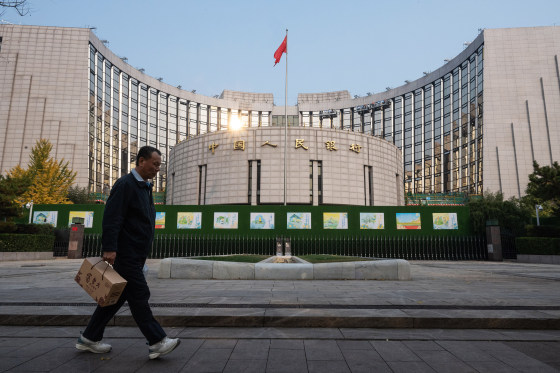
BEIJING —
China
on Friday announced the central government would allocate an additional 6 trillion yuan ($840 billion) to local governments for tackling hidden debt issues.
The program takes effect this year and will run through the end of 2026, Chinese Minister of Finance Lan Fo’an told reporters. That breaks down to around 2 trillion yuan a year.
More from CNBC
-
American interest in moving abroad skyrockets after Trump’s win — here’s how many would actually leave
-
How Elon Musk stands to cash in on Trump’s presidential victory
-
What Trump’s historic election victory means for the global economy
Lan added that starting this year, central authorities would issue 800 billion yuan a year in local government special bonds over five years, for a total of 4 trillion yuan.
The policies will reduce hidden debt from 14.3 trillion yuan to 2.3 trillion yuan by 2028, Lan said.
It was widely expected that Beijing would unveil more stimulus after its parliament ended a five-day meeting.
Authorities here have ramped up stimulus announcements since late September, fueling a stock rally. President
Xi Jinping
led a meeting on Sept. 26 that called for
strengthening fiscal and monetary support
, and stopping the real estate market slump.
While the
People’s Bank of China
has already cut several interest rates, major increases in government debt and spending require approval by the country’s parliament, called the National People’s Congress.
That approval was expected to be granted at the weeklong meeting of the legislature’s standing committee, which ended Friday. During a similar meeting in October of last year, authorities had approved a rare increase in China’s deficit to 3.8%, from 3%, according to state media.
Analysts expected
an increase in the scale
of fiscal support after Donald Trump — who has threatened harsh tariffs on Chinese goods — won the U.S. presidential election this week. But some remained cautious, warning that Beijing might remain conservative and not issue direct support to consumers.
When discussing planned fiscal support at a news conference last month, Lan emphasized the need to
address local government debt problems.
At the
parliamentary meeting
, officials had reviewed a plan to increase the limit on how much debt local governments can issue, according to state media. The additional quota would go toward swapping out local governments’ hidden debt.
Nomura estimates that China has 50 trillion yuan to 60 trillion yuan ($7 trillion to $8.4 trillion) in such hidden debt, and said it expected that Beijing could allow local authorities to increase debt issuance by 10 trillion yuan over the next few years.
That could save local governments 300 billion yuan in interest payments a year, Nomura said.
In recent years, the country’s real estate slump has drastically limited a significant source of local government revenues. Regional authorities also had to spend on Covid-19 controls during the pandemic.
Even before then, local Chinese government debt had
grown to 22% of GDP by the end of 2019
, far more than the growth in revenue available to pay that debt, according to an International Monetary Fund report.
Note: Thank you for visiting our website! We strive to keep you informed with the latest updates based on expected timelines, although please note that we are not affiliated with any official bodies. Our team is committed to ensuring accuracy and transparency in our reporting, verifying all information before publication. We aim to bring you reliable news, and if you have any questions or concerns about our content, feel free to reach out to us via email. We appreciate your trust and support!
